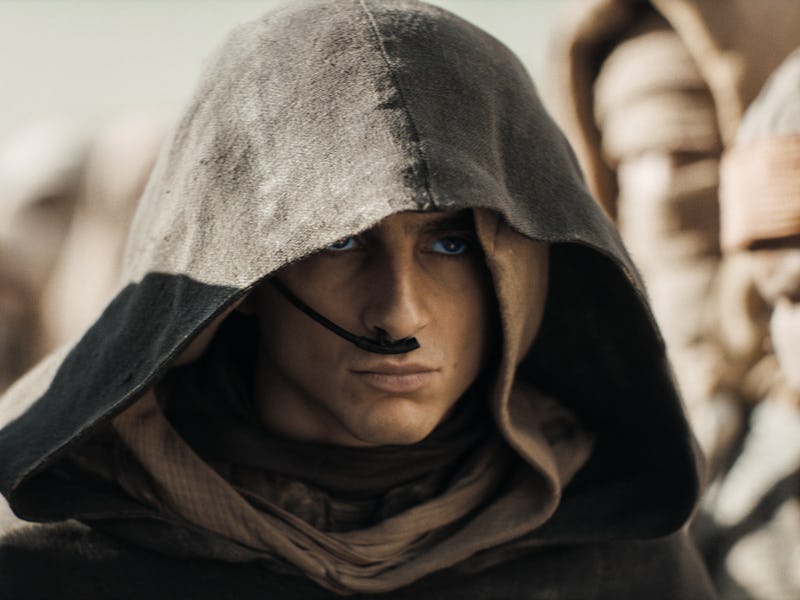Dune 2’s Bleak Ending Brings Its Subversive Story Full-Circle
"We're all Harkonnens."

For the majority of Dune: Part Two, Paul Atreides (Timothée Chalamet) insists that he has no interest in being a messianic figure. He tells his paramour, Chani (Zendaya), numerous times that he doesn't want to use the Fremen and their considerable firepower for his own gain, but would rather help them fight their Harkonnen oppressors. Then, after he drinks the Water of Life, everything changes.
In one of the film's most chilling and powerful scenes, Paul uses his clairvoyant abilities to loudly announce himself as the Lisan al Gaib, the Fremen's long-prophecized messiah. He leads his followers on an all-out assault against the Harkonnens and Shaddam IV (Christopher Walken), the Emperor of the Known Universe, as well as all the royal houses that refuse to acknowledge his hostile ascension. It's a sudden, unsettling turn, but one that is explained by a quietly dark, second-act scene between Chalamet's Paul and his mother, Jessica (Rebecca Ferguson).
In the Dune universe, the Harkonnens aren’t just everwhere, but also everyone.
After Paul chooses to drink the Water of Life, he enters a comatose state. In his dreams, he sees a vision of his future sister, Alia (Anya Taylor-Joy), standing in front of an inexplicable body of water on Arrakis. Alia tells him that he's going to learn the truth about their family, and notes that he is "not prepared" for what the future holds. Later, after he's awoken from his Water of Life-induced coma, he tells his mother that he knows she is the daughter of Baron Vladimir Harkonnen (Stellan Skarsgård).
That not only makes Jessica yet another product of the Bene Gesserit's malevolent, centuries-spanning breeding program, but it also makes Paul a descendant of both the Atreides and Harkonnen lines. As he sits in the wake of this revelation, he dryly observes, "So we're all Harkonnens." Shortly thereafter, he assumes full religious control of the Fremen with the same kind of reckless fervor that he'd previously tried to avoid. Why? Dune: Part Two director Denis Villeneuve leaves that question open to interpretation, but this writer would argue it has everything to do with Paul's discovery of his Harkonnen ancestry.
Up to that point, Paul seemed to genuinely believe that he was different from the people who had conspired to kill his father and spent centuries hurting and manipulating the Fremen. When he learns that he is the grandson of the very villain he's spent so long trying to unseat, though, Paul's black-and-white ideas of good and evil are obliterated. No one's hands are completely clean in the Dune world, and it seems like it's that realization that leads Paul to throw caution to the wind. It's almost like he decides that the central powers of the universe have so purposefully corrupted it that it doesn't matter how he beats the Emperor and the Harkonnens.
If blood is shed across the universe, how much of the blame rests on Paul's shoulders, and how much rests on the people who worked so hard to put him in such a powerful, dangerous position in the first place? His ultimate decision is a cynical one, and it's born out of the bitterness and rage he feels over just how manipulated he, everyone he loves, and the world around him has been.
Chani’s original question is heartbreakingly answered in Dune: Part Two.
Paul's revelation about his Harkonnen ancestry doesn't just explain his decisions in Dune: Part Two's bloody third act, but it also allows the film to tap into a feeling that seems to be increasingly common right now, which is that evil isn’t something that any of us can claim to be fully divorced from anymore. Just like how the Bene Gesserit’s breeding program led to the interweaving of too many families, powers, and opposing ideologies, it seems like the real world's most powerful political parties, nations, and public figures have all grown so tainted to the point that it's becoming harder for anyone to feel completely separate from the darkness present in many of our news headlines and current events.
All it takes is one look at any social media feed to get a sense of the pervasive disillusionment that feeling is causing throughout the world. What do you do when you're made to feel powerless and incapable of making any choices that you can feel even remotely good about? In Dune: Part Two, Paul Atreides responds to those emotions by embracing a nihilistic perspective that prioritizes his own rage over the collateral damage created by his actions, and that's an instinct that has become unfortunately recognizable and relatable.
Both the film's Harkonnen twist and Paul's rise to power also allow it to pay off one of the most haunting lines from 2021's Dune: Part One, which begins with Zendaya's Chani wondering, "Who will our new oppressors be?" Paul is an Atreides and a Harkonnen, which means the Fremen's new oppressors end up, quite literally, being the same as their old ones. The implications of that outcome are unnerving to consider both within and outside of the fictional world of Dune.